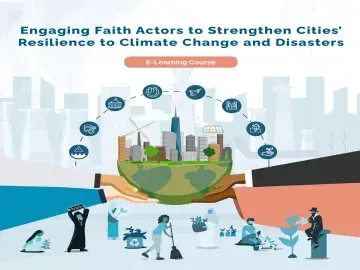Engaging Faith Actors to Strengthen Cities' Resilience to Climate Change and Disasters
Over the past 20 years, disasters have affected 4.4 billion people, caused USD 2 trillion of damage and killed 1.3 million people. Disasters have affected people living in developing countries and, in particular, the most vulnerable communities within these countries.
Particularly in the context of increased urbanisation, the urban risk continues to rise. The vulnerability of cities to disasters is growing especially as low income people settle in high-risk urban areas. Unfortunately, some city planners and developers have overlooked the consequences of hazards such as earthquakes, hydro-meteorological risks and others. As a result, there is a pressing need for countries to prioritize the safety of urban residents by developing innovative strategies to enhance city resilience.Religious leaders and faith communities have a long history of engaging in disaster relief and providing humanitarian assistance alongside faith-based organizations (FBOs).2 These groups are often among the first to respond to crises and play a continuous role before, during and after disasters. Their efforts include developing early warning systems, prevention and building community inclusion, cohesion and resilience.
Faith communities are a valuable potential partner that, when effectively engaged by the government, can help their cities and communities prepare for, respond to, and recover from disasters or public health emergencies. They need to collaborate and coordinate with government officials in building more resilient cities and cohesive communities. They should be at the table when the decisions about preparedness and response efforts are made. If actively and effectively engaged by city/ local and/or state-level emergency and public health preparedness managers, faith communities can be a valuable resource in all stages of the disaster lifecycle— mitigation, risk reduction, prevention, and preparedness planning, as well as response and recovery.2
National and municipal leaders should adopt amulti-stakeholder engagement model to pool resources and collaborate on creating safer urban environments and developing innovative strategies to foster climate resilience.
Based on these needs, the International Dialogue Centre (KAICIID), in consortium with the United Nations Environment Programme (UNEP), ICLEI – Local Governments for Sustainability and the MCR2030 Global Initiative have developed a six-module, six-week moderated/instructor-led e-learning course.
The course is open to faith actors including religious leaders, staff of FBOs, city and local government officials, disaster management professionals, representatives from academic and training institutions working on disaster risk reduction, climate change adaptation, and sustainable development and individuals interested in this field.
The joint e-learning course consists of six thematic modules, each administered over a six-week period. Below is a list of the course modules along with their thematic content areas.
-
Module 1: Faith-based Approach for Cities Resilience-building Efforts and Trends in Urban Risk Reduction
-
Module 2: Using IRD/ICD to Support the Implementation of the Sendai Framework, Paris Agreement and SDG
-
Module 3: Scaling-up Community-level Faith-based Engagement in Eco-DRR for Cities' Resilience
-
Module 4: Using Disaster Resilient Scorecard Tool to Assess and Analyse Cities' Resilience Gaps and Needs
-
Module 5: Developing a Resilient City Action Plan and Setting Indicators for its Monitoring and Evaluation
-
Module 6: The Conceptual Framework for Scaling Up Faith-based Approach to Strengthen Cities' Resilience
The primary objective of this course is to equip municipal government officials with the tools, guidelines and methodologies to effectively collaborate with faith-based actors to boost their cities' resilience and disaster risk reduction efforts. Additionally, the course seeks to motivate national and local governments, UN agencies, and intergovernmental organization staff to adopt faith-sensitive development policies and programmes. These initiatives will help strengthen cities' resilience to climate and disaster risks and promote sustainable development.
Learn and apply key concepts, models, principles and approaches of interreligious and intercultural dialogue to effectively engage city government officials and faith actors in strengthening the resilience of cities and communities to climate and disaster risks.
Recognise current challenges and trends, current challenges and trends, and understand the vital role that religious leaders and FBOs play in enhancing city efforts to build resilience against climate change and disasters.
Gain an increased understanding of the tools and methodologies for conducting city resilience and vulnerability assessments through a multi-stakeholder engagement approach, and develop action plans and strategies for creating resilient cities.
Acquire practical skills to replicate or implement the case studies, best practices and proposed tools and models presented during the course in their respective countries and cities.
This joint e-learning course is delivered online through KAICIID’s Moodle (LMS) platform. This six-module course, grounded in KAICIID's pedagogical principles for adult learning, offers interactive lessons that cover the basic concepts of disaster risk reduction and urban resilience. In addition to these lessons, participants will complete practical exercises to apply what they've learned to real-life situations. Collaborative activities and online discussion forums are other core elements of the course, organized to create collective knowledge and experience sharing and to facilitate interaction. The course also includes formative exercises as well as quizzes. A moderator guides participants through all the learning activities.
Interactive Modules. Each module of the course includes interactive end-of-module tests and exercises that give participants the chance to self-assess their knowledge. These exercises can be repeated as often as desired, as the results do not count toward the final grade. At the end of the course, participants will take a final test based on the material learned in the course.
Discussion Forums. In each module, participants can access user-friendly forums to discuss topics, share their experiences and lessons learned, and work online on short collaborative projects or exercises to discuss thematic content and questions initiated and facilitated by the course moderator. Participants are also invited to initiate new discussion topics as desired. All forums will be moderated by KAICIID’s course coordinator and course moderator/facilitator. By contributing to the forums, participants gain a unique opportunity to increase their knowledge of the specific subjects discussed and to share views and ideas with other course participants.
Case Studies. These exercises provide participants with a space to express opinions, share experiences and put acquired knowledge into practice. Some activities will redirect students to the forum, so they can exchange views and lessons learned with other course participants.
Participant Assessment via Evaluation Quizzes. Comprehension of the course content will be assessed through brief, mandatory quizzes at the end of each module. Each of the six quizzes contains a variety of question styles including multiple choice, true or false, matching, etc. Participants can attempt each evaluation quiz an unlimited number of times, without incurring penalties toward the final score.
A Certificate of Completion will be issued to participants who achieve a minimum total score of 70% and who complete all the mandatory activities.
Modern and updated browsers
-
The United Nations Environment Programme (UNEP)
-
ICLEI – Local Governments for Sustainability
-
MCR2030 Global Initiative
![]()

![]()
E-Learning in IRD designed for the general public


